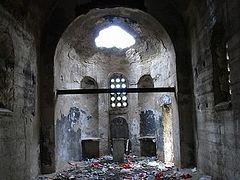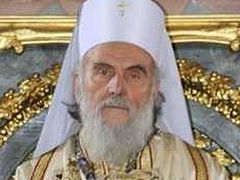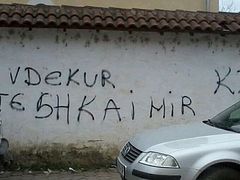Barbed wire around the perimeter of the monastery walls and the empty booths of the sentry posts are reminders of the recent war, when KFOR1 soldiers—mostly Swedes—were on guard here. Now the security guards have been withdrawn. But the most noticeable trace of the war is in the eyes of the inhabitants of Gračanica,2 in their conversations and their memories. Any child can tell you about war: if before, in order to hear about it, you had to ask grandfathers and grandmothers, now you don’t have to go far—just listen to what the children talk about who grew up in Kosovo: it’s by no means always about new computer games or difficult homework.
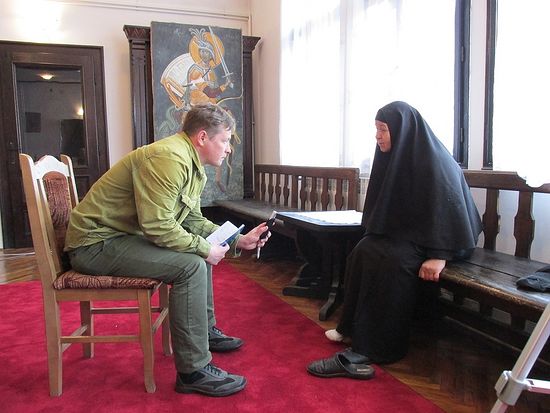
But in the monastery—tranquility.
— Kako? Imate kravu?
— Imamo pet! Svinija, kokoshki, sve! Ekonomia!
“What? You have a cow?” I ask in Serbian.
“We’ve got five! Pigs, chickens—everything! Economy!” relates Mother Theodora, not without lawful pride in the convent housekeeping, and she apologizes for being late: She was feeding these very “kokoshki,”—chickens, as we say.
No matter what, in the monastery there is good peace, bright sorrow, and the unshakable certainty: Christ will be victorious.”
From the refectory window a splendid view of Gračanica unfolds: the Dormition Cathedral, soft sunlight, light refreshing rain—as if this light is shining into your heart and the rain refreshes it. We have found more than once that a monastery is like an island of Heaven on this miserable earth. You can feel it especially here, in Kosovo and Metokhia, a land that is very difficult to call “happy” in the worldly sense of the word. So much the more joyful to see the little island of Heaven that has been preserved: here people are a little bit different. Now the war has passed, in which Serbia suffered defeat. Now new, spiteful “landlords” have appeared, for whom Orthodoxy is an annoying hindrance. Refugees from other areas of Metohia, where these “landlords” have gotten what they were after: they have destroyed all the churches and driven the Christians out of their homes—the Christians have had to flee to here, to Gračanica, to try to finish building a house and to live in a new place. But in the monastery no matter what, there is good peace, bright sorrow, and a firm, unshaken conviction that Christ will be victorious all the same. For there has already been an example—then, on Golgotha. It is not for nothing that Kosovo is called the Serbian Golgotha.
And so, here is our conversation with Nun Theodora of the ancient Serbian monastery3 of Gračanica:

—Mother Theodora, when and by whom was Gračanica Monastery founded?
—Construction began in 1313 and finished in 1321. In the course of seven years the monastery was built and completely painted with frescoes. The builder of the monastery was the holy King Milutin. At the court of holy King Milutin a school, a studio was organized; these masters—Slavs and Byzantines from Constantinople and Thessalonika—also worked at the construction and frescoing of Gračanica. The mastery of the church artists was so great that King Milutin, as goes the legend, paid a pound of gold for a pound of special paint that was used in the frescoing of the cathedral.
There are 4000 frescoes in the church, in all! King Milutin was in power for 40 years, and during this time he founded 40 establishments—churches, hospitals, and monasteries—magnificent gems of medieval architecture. They were built not only in Serbia, but also in the Holy Land and in Bulgaria. Holy King Milutin (Nemanjić)4 was one of those greatest Serbian monarchs, who glorified their Fatherland and strengthened the spirituality and culture of their people.
—How does Gračanica live today? How many sisters are there in the monastery? Do the inhabitants of the village help them with anything?
—Right now there are 20 nuns and novices in the monastery. There are also the priests and permanent workers—about 30 people in all. Sometimes other, hired, workers come. But you yourself know that in the present circumstances the monastery is in no condition to pay a lot. And I would very much like to mention and express my thanks for the help that the Greeks provide. During the whole time of the war the Greeks gave us a huge amount of help: with food and money and diplomatic support. Our Russian brethren made donations towards setting up the kitchen—our profound thanks!
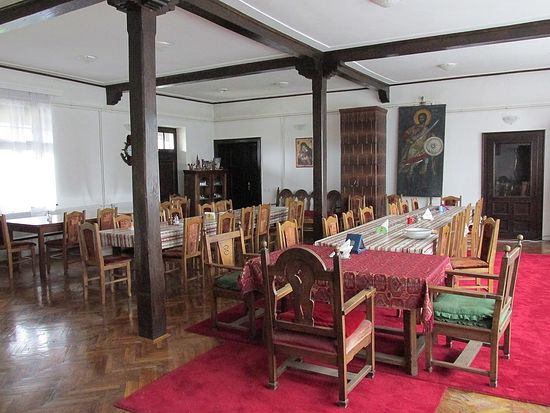
—Tell us, was it frightening during the war?
“Glory to God, no rockets fell on the monastery. But the Tomahawk missiles destroyed our vineyard.”
—Frightening isn’t the word—it was just terrifying! When you are bombed every day and every night, then, believe me, it’s frightening. But when this lasts several months, then fright gives way to terror. Glory to God, no rockets fell on the monastery, but the Tomahawks missiles destroyed our vineyard and the house next to it. There was a miracle there: At the time we were under fire old Grandfather Pero was in the house. The old caretaker of the vineyard lingered—he didn’t try to flee anywhere. A Tomahawk missile made a direct hit: the whole house was turned into ruins in a second. When the dust settled, there was old Pero standing there looking around. Later our soldiers asked him, “Grampy Pero, how are you still alive?!”
He answered, “The American bombs are like children’s “play war.” But old grandfather Pero believes in God! And with God, the whole world can’t do anything to him.” Grandfather Pero’s example is an inspiration for all of us even now—let it be an inspiration for you, Russian brethren: Russians, pray now, yourselves to the Lord and the Mother of God—and no one can do anything to you!
That’s why we aren’t afraid: if God is for us, who is against us? Take me, for example: I have lived here since I was 14—I’ve lived in Gračanica 59 years.
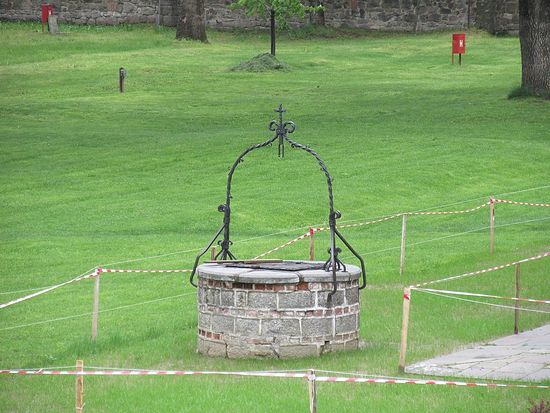
If Hashim Thaçi5 knew how many people, including Albanians, have received protection and help, have been saved and are being saved through the intercession of the Most Holy Mother of God, by the prayers of the Holy Church, he never would have said those stupid words claiming that the Orthodox church in Prishtina6 “disfigures the appearance of the city”! If you destroy the church, God will also destroy Prishtina. In fact, he ought to know this, after all: his great-grandfather was an Orthodox priest… And all the evil that happened in Kosovo and Metohia was wrought by the hands of janissaries,7 ethnic Serbs who converted to Islam. But real Albanians are very fine, good and God-fearing people.
—That means, one may say that, according to you, all evil is from those who act like Judas?
Betrayal of Christ and Orthodoxy never ended and never ends in good for either one person or a whole nation.
—Yes, that’s right! And it relates not only to Serbs, but also to other peoples: Ukrainians, Russians, Albanians, Americans and whoever else there may be. Betrayal of Christ and Orthodoxy never ended and never ends in good for either one person or a whole nation. When “Christian, educated European people” went—supposedly to liberate the Lord’s Tomb from the infidels, —Englishmen, Germans, Italians and the others simply seized Tsargrad8 and carried out slaughter in it, desecrated the churches of God, turned them into horse stables, drank wine out of the holy church vessels—what kind of Christians were these?
“Two people remained in the monastery with the heretics. One went to the belfry to ring the bells—the bell fell and killed him…”
The following incident also happened with the Judases of that time: bandits came to the Holy Mountain and devastated it. One elder, who worked in the vineyard on Athos, was reading the Akathist to the Theotokos. The Mother of God appeared to him and said, “Go into the monastery and tell the Abbot: Whichever of the brethren want to, let them flee into the forest, but whoever doesn’t flee, the enemy will give him no peace.” Out of all the brethren, 300 monks hid in the forest; only 25 stayed. The invaders came and locked the monks who had stayed in the belfry. Two of the monks became frightened and went over to the enemy side. The robbers burned the 23 monks locked in the belfry. Two stayed in the monastery with the heretics. One went to the belfry to ring the bells—the bell fell on him and killed him. The other went into the field, and a snake bit him. And they buried the bodies of both of these monks in the monastery. Holy King Milutin freed the Holy Mountain from the Uniates and drove them away. Then he summoned the monks who had fled into the woods to return to the monastery. After a year had elapsed the brothers who had returned—in accordance with Athonite tradition—dug up the bodies of the two monks who had perished in order to place the remains in a special burial vault. But their bodies were intact! Only black. And this is a sign of damnation. And they put these bodies in large containers and brought them to Greece, and there they are to this day with this appearance: as if alive, but—black! After 700 years have elapsed already! They are in these vessels and await the Dread Judgment…. I have seen them—really, it is frightening. The fate of traitors is horrible.
—Do pilgrims come to your monastery now? Are there many, and where are they from?
—They come from all countries: Greeks, Russians, Bulgarians, Arabs and many others. Before the war there would be up to 50 busses a day—now, of course, a great deal fewer. Many people see that Gračanica’s architecture is the most beautiful in the world.
The nation where there are many monks and nuns and other Christians—but only sincere, praying with their whole hearts—will not fall, of this I am convinced. But the country where they go after Christians, where they persecute Christ, will vanish without fail, will fall. Look here, for example, in Kosovo—there have been Greeks and Romans and even the people from the Caucasus who have arrived from far away—all of them have persecuted Christians. And, as our legend goes, in 1025 twenty-five towns, where infidels and invaders lived, collapsed under the earth. Of course, one can’t help but compare this with its analogy from the Bible, with the cities of Sodom and Gomorrah which are well known to all.
Oh, if only the Serbs and Albanians lived in peace and harmony with each other, if only they prayed together to the same God, Christ, then our life would be long and happy! But if they continue to persecute Christians here, to kill them and torture them, then that kingdom will not stand long—mark my words!
—What do you have to say to the Orthodox people of Russia?
“Who will help your country but God and the Mother of God? That is the mightiest defense, the most powerful protection for Russia.”
“Only one thing: pray to God, have recourse to the intercession of the Most Holy Mother of God. Who will help your country but God and the Mother of God? That is the mightiest defense, the most powerful protection for Russia. To be sure, of course, you yourselves must by no means slip up; but our main defense, I repeat, is from the Lord. God is stronger than rockets. Remember how many times the Lord has saved Holy Rus’ from its enemies—as when the barbarians fled when they saw the Queen of Heaven surrounded by an army of angels. And this army, believe me, is able to overcome any adversary—if only we, Christians, conform to the criteria of this army and its rules. More simply put, in order for us to be victorious, we have to be Orthodox. If God is for us, who is against us? God will destroy any enemy stronghold, will sweep it away like a spider web—how much confirmation we have of this omnipotence of God’s in our history! Only we have to be worthy of this omnipotence—all of us: Serbs, and Russians and others. Was the army of holy Emperor Constantine large? But with faith in God he destroyed the mighty, seemingly eternal, pagan Rome. When God does His work, no one can hinder Him—and with these words I would like to end our conversation. Greet9 our beloved Russia!
***
Mother Theodora hurried off to her “kokoshki,” her chickens. But we didn’t want to leave the monastery for a long time after this: truly, a little island of Heaven. Come visit Gračanica!

